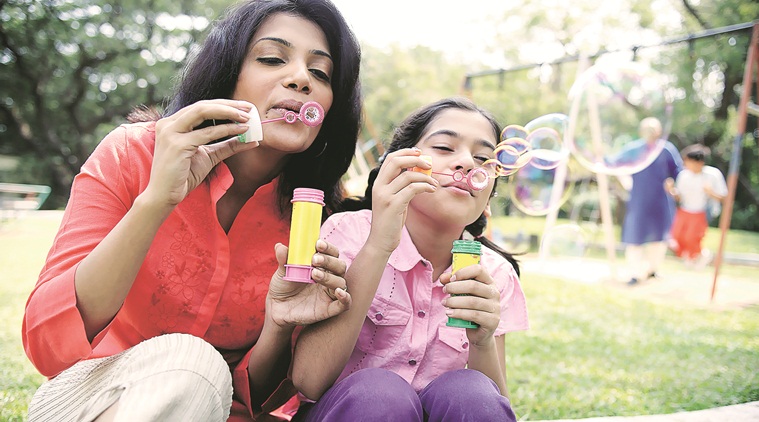Little Johnny needs to play: Why Indian parents need to switch off the iPad
Around 60 per cent of Indian parents feel guilty about not spending enough time with their children — the highest in the world — followed by China at 57 per cent.
 From peek-a-boos to playing pretend games and singing rhymes, play gives a child a multi-chanelled experience
From peek-a-boos to playing pretend games and singing rhymes, play gives a child a multi-chanelled experience
A recent report by Ikea, the Swedish company known for its Scandinavian modern style furniture, calls India a “time-poor” country. In Play Report 2015, it lays out the results of a study on children and playtime — over 30,000 parents were interviewed online across 12 countries. India tops on three fronts.
Around 60 per cent of Indian parents feel guilty about not spending enough time with their children — the highest in the world — followed by China at 57 per cent. They not only feel stressed when playing with children but the children too (7-12 year olds) feel their parents are always in a rush. We come first again in the safety quotient, where 75 per cent parents feel they are over-protective and don’t let their children play outside for fear of strangers or traffic. The US comes second with 62 per cent. The third category is the use of digital devices. Nearly 38 per cent parents say that playing on the smartphone qualifies as family time. China is a close second with 31 per cent. In the light of these studies, we spoke to a few parents and a child and adolescent psychiatrist about the integration of play in the lives of children; its absence, its benefits, and what it means to have gadgets as babysitters.
Delhi-based Dimple Gupta, a mother of two girls (14 and 9), rues that her children don’t play in parks anymore because others in their age group don’t come, which means the only time they play is in school. “I believe play is the primary pillar of childhood. It’s how children bond, learn and grow. However, it’s true that gadgets have taken over their playtime. In the process, I doubt if they will pick up life skills. On the playground, you learn leadership and patience. You learn how to pacify those younger to you, maintain relations with your peers and observe older children. You know that you cannot antagonise the five friends you have, because tomorrow they are the same people you will need to play with. That doesn’t happen with a tablet or smartphone.”
Dr Amit Sen, senior consultant child and adolescent psychiatrist of Delhi’s Children First, says among the many benefits of play is that it helps sequential tasking. “With a gadget, when you press a button, you get an answer. However, on the playground, you have to wait for your turn. You have to understand others have their own needs, and you learn patience and cope with frustration. A child who wants to play on the slide will think about first removing his shoes, because he knows it will give him better grip. There’s cognitive learning taking place as well.”
From the time a child is barely three months old, play is her most natural and spontaneous activity. From peek-a-boos to playing pretend games, from jumping off trees to singing rhymes, play gives a child a multi-channelled experience. Be it emotional bonding, developing fine and gross motor skills, being creative or understanding the world around them, rolling in the mud does have its benefits. “I find my six-year-old has better immunity and needs fewer visits to the doctor because she’s very active on the playground. Her father plays tennis and she is learning to field a few balls herself. It has helped her understand that she needs to eat well so she can play. Because she gets to spend time with me or her dad, she would rather leave the television behind so she can play with us,” says Shweta Sharma, who works with the spirits brand, Beam Suntory, in Delhi.
Mumbai-based Vijay Iyer learnt it the hard way. The 39-year-old assistant to music composer AR Rahman and his wife called themselves “new-age parents”. “I would proudly tell my friends that my three-year-old son could unlock my iPhone and was very tech-savvy. He’s nine now and we’re finding it difficult to wean him away because he has grown addicted to it. We found that these gadgets don’t really help in any development of the child, be it social skills or language efficiency. We’re encouraging him to read and play now. We didn’t make the same mistake with my three-and-a-half year old daughter. We don’t go to the mall anymore; instead, we take her to a garden or the beach, driving all the way from Thane to Malad,” he says.
While we live in times where schools don’t have playgrounds and being outside the house doesn’t necessarily mean playtime, one questions where the twain can meet. Kavita Rajesh, an applications developer in Mumbai, makes the most of her weekends with her six-year-old daughter. “I read to her at bedtime. We draw and paint together. There are days when we go to the park only to gather flowers,” she says.
That Indian parents lack what Dr Sen calls “Playfulness Quotient” is reinforced in the Ikea Play report, which says most parents feel stressed when playing with their children. “Can you get down on your knees?” is his question to parents. “I think if you are able to get in touch with your inner child and play again, even for half an hour, you will see it’s a great stress-buster. It doesn’t have to be an outdoor game, it could be dumb charades or making up a song. The key thing about play is that it shouldn’t be driven by an agenda.” So let go and give play a chance.
With inputs from Shikha Kumar



- 01
- 02
- 03
- 04
- 05
























